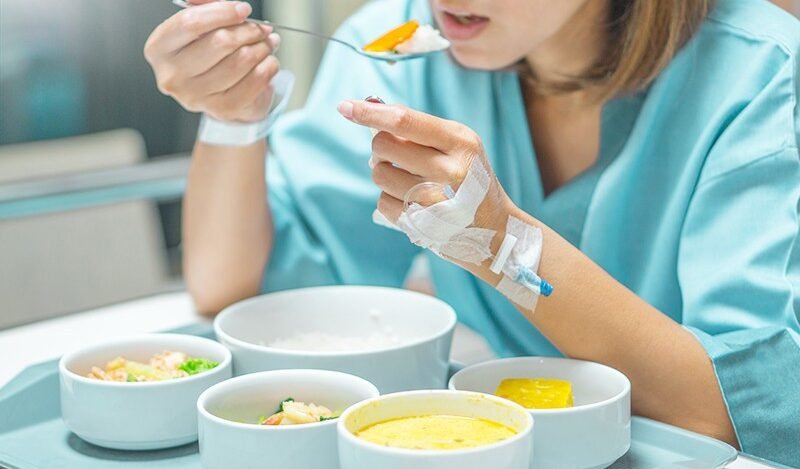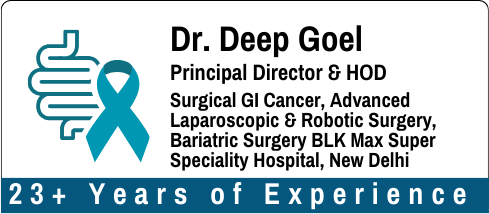What Should You Eat for Faster Recovery After Gastrointestinal Surgery?

Gastrointestinal (GI) surgeries, whether for conditions like Crohn’s disease, ulcers, or tumours, are complex and critical. The recovery period following GI surgery is crucial for restoring health and ensuring the body functions optimally again. The right diet can significantly affect how quickly and effectively the body heals.
Globally, millions of patients undergo GI surgeries every year. Ensuring proper post-operative care, especially dietary management, is essential to prevent complications and enhance recovery. As renowned Gastrointestinal surgeon Dr. Deep Goel mentions, “Your body’s ability to heal post-surgery is directly tied to what you feed it. A balanced, nutrient-rich diet can make the difference between a slow recovery and a speedy one.”
In this blog, we’ll discuss the best foods to eat post-GI surgery, tips from experts like Dr. Goel, and real-life experiences from patients who’ve undergone similar surgeries.
Why is Nutrition Vital for Recovery After GI Surgery?
Nutrition acts as the building block for healing after gastrointestinal surgery. The body requires essential nutrients like proteins, vitamins, and minerals to repair tissues, regain strength, and boost the immune system. Post-surgery, the digestive system may be more sensitive, which is why a carefully planned diet is crucial for preventing complications like infections, bloating, and poor digestion.
Dr. Deep Goel, who has performed numerous GI surgeries globally, emphasises, “Proper nutrition is the key to avoiding post-surgical complications. A balanced diet can dramatically improve the speed and quality of recovery.”
What Should You Eat Immediately After GI Surgery?
In the first few days after surgery, the digestive system is still healing, so it’s best to stick to a liquid or soft diet. This allows the gastrointestinal tract to rest while you receive adequate nutrition.
- Clear Liquids: Broth, herbal teas, and electrolyte-rich drinks are ideal for the first 24-48 hours. They are easy on the stomach and help maintain hydration.
- Soft Foods: Gradually, you can introduce soft, bland foods such as applesauce, mashed potatoes, and porridge. Soft foods are easier to digest and less likely to cause strain on the gut.
One of Dr. Deep Goel’s patients, Amit Kumar, who underwent gastrointestinal surgery, shares his experience: “In the initial days after surgery, Dr. Goel recommended a liquid diet that helped me avoid discomfort. I was nervous about how I would manage, but his diet plan eased the process for me.”
When Should You Start Incorporating Solid Foods?
As your body begins to heal, you can slowly reintroduce solid foods into your diet, but only under your doctor’s guidance. Dr. Deep Goel recommends starting with easy-to-digest, low-fibre foods such as:
- Lean Proteins: Soft-cooked eggs, chicken, and fish are excellent sources of protein that aid tissue repair.
- Low-Fibre Vegetables: Carrots, zucchini, and peeled potatoes can be steamed or boiled until soft.
- Whole Grains: White rice, oatmeal, and refined grains are easier on the digestive system.
“Your diet should evolve as your body heals. Introduce foods slowly and listen to your body’s response,” advises Dr. Goel. “The goal is to avoid putting unnecessary strain on your digestive system.”
What Foods Should You Avoid During Recovery?
After gastrointestinal surgery, certain foods can irritate the digestive system and slow down recovery. Avoiding these foods is crucial to preventing discomfort and potential complications:
- High-Fiber Foods: Vegetables with tough skins, seeds, and whole grains can be hard to digest initially.
- Fatty and Fried Foods: These can cause bloating and indigestion.
- Spicy Foods: Spices may irritate the stomach lining.
- Caffeinated and Carbonated Beverages: These can increase acid production and cause discomfort.
Patient Sonal Mehta, who was treated by Dr. Deep Goel, shares her story: “I thought my recovery would be difficult because I had to give up my favourite spicy foods. But with Dr. Goel’s guidance, I found delicious alternatives that didn’t upset my stomach and helped me heal faster.”
What Role Do Proteins Play in Healing?
Proteins are the building blocks of tissue, making them essential for healing after surgery. A high-protein diet supports muscle repair, boosts the immune system, and helps rebuild damaged tissues. Include the following protein-rich foods:
- Lean Meats: Chicken, turkey, and fish provide high-quality proteins.
- Plant-Based Proteins: Tofu, lentils, and legumes are excellent options for vegetarians.
- Dairy Products: Low-fat yoghurt, cottage cheese, and milk also offer protein and calcium for stronger bones and muscles.
“Protein is the foundation of your recovery. It fuels the healing process, ensuring that your body has the resources it needs to repair itself quickly and efficiently,” explains Dr. Deep Goel.
How Can You Promote Gut Health During Recovery?
Maintaining a healthy gut is crucial after gastrointestinal surgery. Probiotic-rich foods introduce good bacteria that can balance the gut’s microbiome, aiding in digestion and preventing infections. Incorporating these foods into your diet can promote gut health:
- Probiotics: Yogurt, kefir, and miso are rich in probiotics that support digestion and boost immunity.
- Fermented Foods: Sauerkraut and kimchi introduce beneficial bacteria to the gut.
- Prebiotic Foods: Bananas, asparagus, and garlic feed healthy gut bacteria.
Dr. Goel adds, “A healthy gut reduces the risk of post-surgical complications like infections and bloating. Including probiotics in your diet can strengthen your recovery.”
How Can You Ensure Long-Term Recovery Success?
Once the initial healing process is over, it’s important to maintain a balanced, nutritious diet that supports long-term health. Dr. Deep Goel recommends the following tips for sustained recovery:
- Hydration: Drink plenty of water to stay hydrated and support digestion.
- Balanced Meals: Include a variety of nutrients—proteins, healthy fats, and carbohydrates—in your meals.
- Regular Check-ups: Follow up with your surgeon to monitor your progress.
What Is the Cost of Gastrointestinal Surgery in India?
The cost of gastrointestinal surgery in India varies significantly based on the procedure, hospital type, and location. Simple surgeries, like laparoscopic cholecystectomy, can range from INR 50,000 to INR 1,50,000 (approximately 600 to 1,800 USD). Moderate procedures, such as appendectomy or hernia repair, typically cost between INR 70,000 and INR 2,00,000 (around 850 to 2,400 USD). Complex surgeries, like colorectal procedures, can range from INR 1,50,000 to INR 5,00,000 (1,800 to 6,000 USD). Tier 1 cities generally have higher costs compared to Tier 2 and 3 cities, and insurance coverage can further reduce out-of-pocket expenses.
Conclusion
Recovering from gastrointestinal surgery requires patience, but with the right dietary choices, you can speed up the healing process and regain your strength. Listening to your body, following your doctor’s advice, and nourishing yourself with the right foods will make your recovery smoother. As Dr. Deep Goel wisely puts it, “Your body is capable of remarkable healing when given the proper fuel. Focus on nutrition, and your recovery will follow naturally.”
By adopting these dietary strategies, you can set yourself on the path to a quicker and more comfortable recovery, ensuring long-term health and wellness.
FAQs
When can I start exercising after gastrointestinal surgery?
You can typically begin light exercises like walking after 2-3 weeks, but always consult your doctor for personalised advice.
How long will it take to regain my appetite?
It varies, but many patients report a return of appetite within 1-2 weeks, depending on the complexity of the surgery.
Can I take supplements to speed up my recovery?
Yes, but only after consulting your doctor to ensure they are safe and beneficial during your recovery.
Is it normal to experience bloating after surgery?
Mild bloating is common but should lessen over time. If it persists or worsens, contact your healthcare provider.
How important is hydration after surgery?
Hydration is crucial for supporting digestion and preventing complications like constipation. Drink water throughout the day.
Explore more blogs: How Can Diet and Nutrition Help in Managing Gastrointestinal Cancer?

